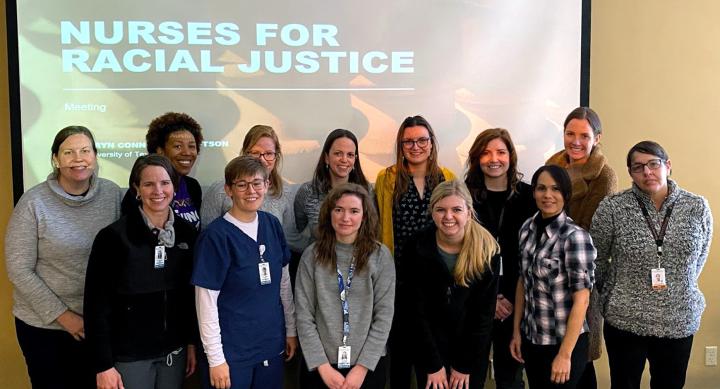
While our country was still processing and mourning the deaths of Ahmaud Arbery and Breonna Taylor, we watched as George Floyd’s life was taken right before our eyes. We continue to grieve the losses of Mike Ramos, Philando Castile, Trayvon Martin, Sandra Bland, Tamir Rice, and countless other black men, women, and children who have died at the hands of those who devalue human life. These traumatic events and resultant suffering are unfortunately not new to communities of color, and are symptoms of a deeper problem with which our nation has yet to grapple.
The protests over the weekend remind us that in this country there exist deep-rooted and long-standing injustices, the result of systems designed to promote the welfare of some and deny opportunities for others. In order to diagnose and treat the malignancy of systemic and institutionalized racism that is woven into the fabric of America, we must critically examine, challenge, and dismantle structures that reinforce racism and protect racists.
It is for these reasons that the School of Nursing's Community Climate and Care committee’s recent efforts have centered around undoing racism. This is not to the exclusion or the neglect of other dimensions of social, ethnic, gender, and sexual orientation backgrounds or the treatment of other marginalized groups, but as witnessed throughout the history of this country, anti-Black racism is paramount. Black Americans often bear the brunt of the worst outcomes in our systems, and we believe that when we raise the bar for those with the worst outcomes, we raise the bar for all.
At the UT Austin School of Nursing, we stand in support of all of our Black students, faculty, staff, clients for whom we care, and all who identify with and advocate for traditionally marginalized groups. It is imperative that we utilize our privilege to influence lasting systemic change.
As faculty, we reaffirm our commitment to educate our students and community about the impact of institutional racism on health and to create a society in which all individuals can live and thrive. We pledge to work to undo racism by educating ourselves and our students about the deep inequities that exist and the underlying causes. We pledge that the students we graduate will exemplify the knowledge, understanding, and compassion in working towards racial fairness and impartiality in all our health care systems.
As students, we openly and wholeheartedly stand in solidarity with the Black community in speaking out and fighting against years of systemic racism and oppression that has infected the criminal justice system. We understand silence and inaction as complicit in perpetuating racism and anti-Black sentiment, so we refuse to dismiss historical and current oppression. We acknowledge that racism and bias are not only present in the criminal justice system, but in the health care system as well; as evidenced by COVID-19’s disproportionate impact on Black Americans and Black infant and maternal morbidity and mortality rates. If we are to truly provide the best nursing care for all, we must directly address the pervasive racism that seeps into our profession.
It is more evident than ever that the systems we have inherited are not broken; they are operating exactly as they were designed. Though we did not create them, it is our imperative to dismantle them and create equitable systems in their place. We encourage fellow nurses and students to seek knowledge surrounding current movements and the history of systematic racism, empower and amplify anti-racist advocacy, make donations to organizations that push the movement forward, and build our collective power by voting. We firmly stand by the belief that all lives cannot matter until Black Lives Matter.
Article submitted in solidarity by: UT Austin School of Nursing’s Community Climate and Care Committee, student organizations, and Nurses for Racial Justice.
Resources
Donate
- Travis County Bail Fund
- Harris County Bail Fund
- Louisville Community Bail Fund
- Official George Floyd Memorial Fund
- George Floyd (BigFloyd) Memorial Fund - Organized by George’s sister
- I Run With Maud - Justice for Ahmaud Arbery Fundraiser
- Justice for Mike Ramos - Austin
- Black Visions Collective - Minneapolis-Based Black Liberation Organization
- NAACP Legal Defense Fund
- Reclaim The Block - Minneapolis Community Safety
Learn
- Combative Racism Resource Guide - Compiled by the UT Student Government
- Anti-Racism Resources for White People
- An Antiracist Reading List (Ibram X. Kendi)
- Is Prison Necessary? Ruth Wilson Gilmore Might Change Your Mind
- Police Reform and the Dismantling of Legal Estrangement
- Enough is Enough by MPD150
- Massive Reading List
- Black Women Radicals and AAFC Solidarity Reading List
Take Action
Thomas Lane, J.A. Kueng and Tou Thoa (3 other officers involved in George Floyd’s murder) have not been charged.
- Call District Attorney Mike Freeman (612) 348-5550
- Call Minneapolis Police Department (612) 673-3000
- Call Minneapolis Mayor Jacob Frey (612) 673-2100
- police@minneapolismn.gov
- policereview@minneapolismn.gov
- minneapolis311@minneapolismn.gov

